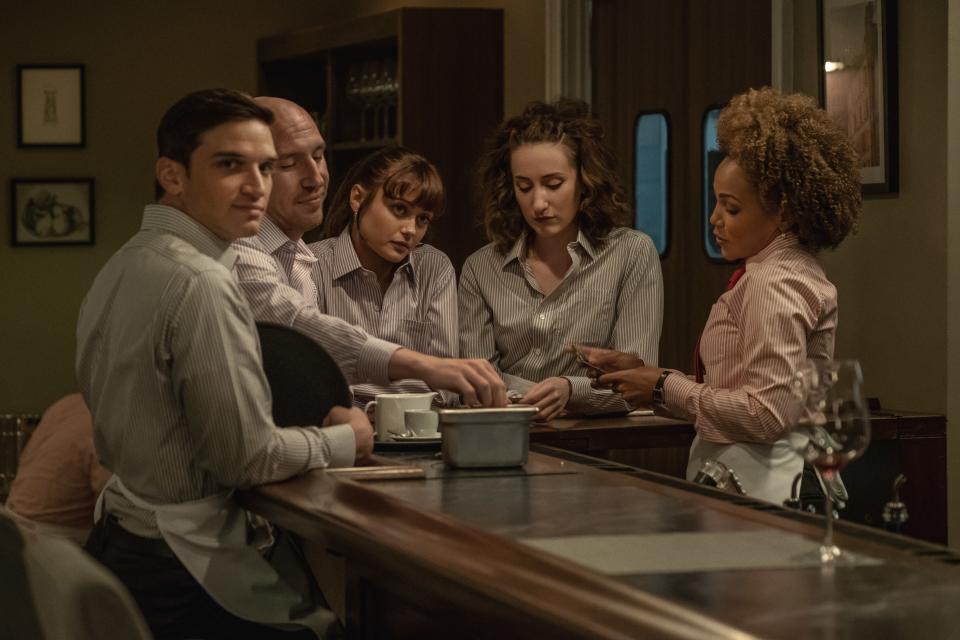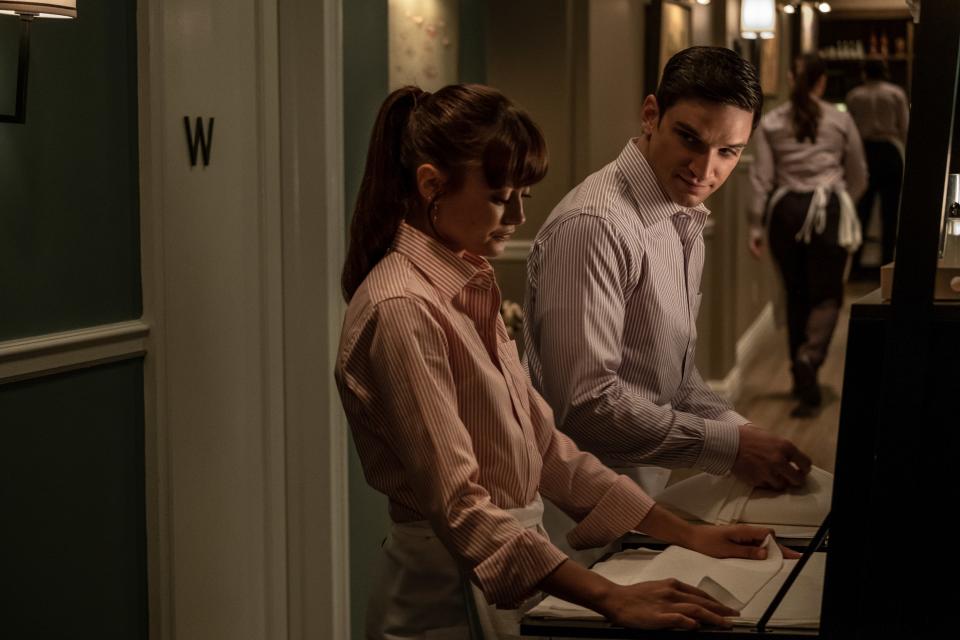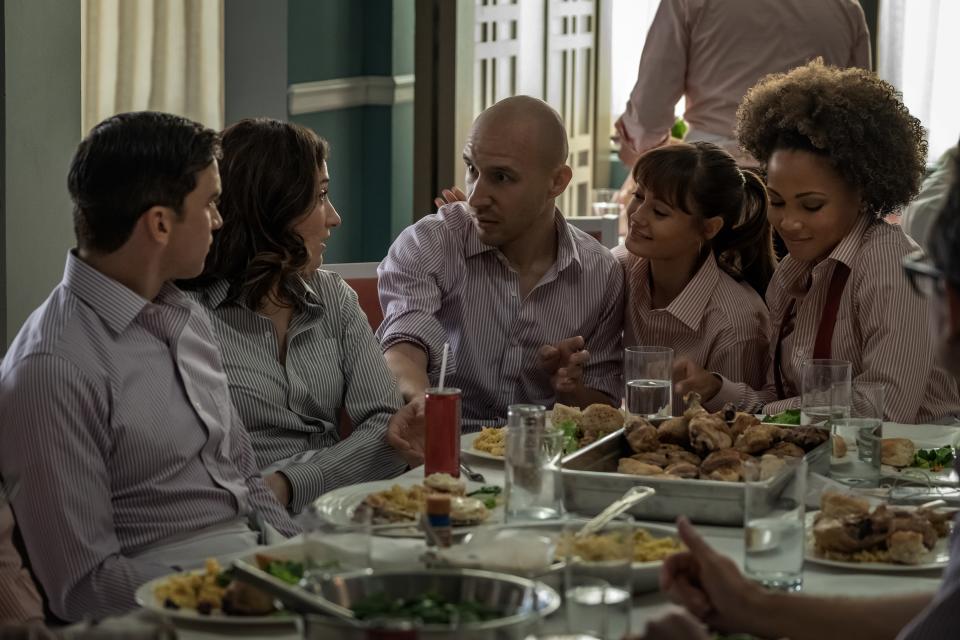What Sweetbitter Gets Right—And Wrong—About Toxic Restaurant Culture
In Sweetbitter’s two-part season-two premiere, which aired last night, restaurant manager Howard (Paul Sparks) gives a startling declaration to Jake (Tom Sturridge), a bartender infamous for his liaisons with female coworkers: The employee handbook is being changed so that all staff members must disclose romantic relationships with coworkers.
“You want to know who I’m fucking?” Jake fires back, smirking.
This sudden push to create a “safe and professional work environment” is hypocritical for Howard: Last season his disastrous affair with the restaurant’s young hostess came to a disturbing conclusion in the middle of a busy dinner service. But it's another way Sweetbitter continues to navigate the murky, often inappropriate relationships that can take place among restaurant staff.

Sweetbitter Season 2 2019
Macall Polay/STARZDespite its distinct soap opera quality, the series has never been shy about taking jabs at the hazards of the service industry: Howard's predatory and patronizing attitude toward our protagonist Tess (now a newly promoted waitress) and the messy on-again, off-again relationship between her and Jake are constant sources of conflict. In both situations, the men hold the power. Binge-drinking and drug use are also widespread among the employees, and long hours working in close quarters lead to unhealthy, codependent relationships. The takeaway: A vulnerable woman trying to establish herself in a fast-paced kitchen faces peril at every turn.
This season the show is doubling down on the message that restaurants can be dangerous places for women (and immigrants, and people of color) to work. In the wake of ongoing allegations that abuse and assault plague the hidden rooms of restaurants, Howard’s change of heart stands out—one that would be conspicuously missing if it wasn’t addressed at all.
To be clear: Tess is not a victim. In the early days of season one, she was naive. Now she recognizes what makes her job treacherous—and still fully embraces restaurant work. In season two’s first few episodes, Tess seems determined to embark on a one-woman mission to improve her coworkers’ lives by enforcing her own policies of support and communication. She helps a beleaguered coworker and urges him to take more breaks; she de-escalates an argument between a server and dishwasher over a part of lost, possibly stolen, sneakers. It sets up the show to interrogate what causes toxic restaurant culture and what it might take to change it.
“I was talked down to, spit at, shamed, and made to feel ‘less than’ for no other reason than my job.”
It's an admirable mission, but some women who have worked as servers themselves feel the show doesn’t grasp the full scope of harassment that can exist in restaurants, or that it's equipped to handle sensitive topics like sexual harassment in a truly nuanced way.
“[I think] Sweetbitter can’t tell the difference between making a joke about how a piece of ginger looks phallic and blatant racism and sexual harassment,” says Sophie*, 29. She has worked as a barista, waitress, and bartender over the years and has, along with the other women interviewed here, watched the first season of the show.
In the real world, Sophie says, she experienced harassment with disturbing frequency: She remembers seeing a chef snap the exposed thong of a server who had bent over to pick something up. In another incident, Sophie says she went to her boss, a restaurateur who encouraged staff to report harassment, in tears over the harassing texts a male coworker had sent after they got in an argument at work. The coworker was disciplined, and the texts stopped.

Sweetbitter Season 2 2019
Macall Polay/STARZTo Sophie the most demoralizing aspect of restaurant work is actually mistreatment from customers—an issue which Sweetbitter addresses more directly in season two. One memory still makes her shudder: While working as a cocktail waitress, a customer commented that her “bra fit really well.” She felt she couldn’t tell him off without risking her job.
“Sweetbitter focuses on sexual tension and partying, but it doesn’t really show how draining and demeaning it can be to work in the industry,” Sophie says. “Being treated like you’re second class or like you’re an idiot [by customers] gets exhausting.”
Lilly*, 29, has worked in food service for over a decade. She says one of her biggest challenges has been watching women, herself included, get overlooked for raises and promotions while male colleagues confidently sought out and were awarded these accolades. And like Sophie, she’s dealt with abusive customers.
“The after-hours debauchery—drinking, taking drugs, and self-destruction—all of that resonated hard.”
“I was talked down to, spit at, shamed, and made to feel ‘less than’ for no other reason than my job. Classism is alive and well,” she explains. “Tess is an earnest twenty-something who always looks adorable. That was not my reality. I felt disgusting and mortified constantly.”
Sweetbitter does get a lot right, though. “I thought the way Tess was objectified seemed pretty accurate,” Lilly says. “She’s young and therefore immediately the target of aggressive flirtations. She’s also constantly navigating unwritten rules. I do think the show captures that sense of being brand new and entering a fully formed universe.”
The scenes in which the staff enjoy free drinks at the bar after the restaurant's closed are also familiar to the women I talked to. Sophie recalls feeling pressured to participate in these nightly rituals to build camaraderie amongst the team. Once, she agreed to take shots with a fellow server in the bathroom during dinner service, worried she’d alienate her coworkers if she refused. When they were caught, she nearly lost her job.

Sweetbitter Season 2 2019
Macall Polay/STARZ“The after-hours debauchery—drinking, taking drugs, and self-destruction—all of that resonated hard,” Lilly says. “For me it was exactly as the show suggests, a Tilt-a-Whirl of depression and fast friendships.”
Tanya*, 48, has worked as a waitress, bartender, and hostess for over 30 years. She immediately related to the tight-knit band of servers on Sweetbitter. As she explains, when she started working in the industry the environment was even more extreme than what the show depicts.
“People were screwing in the walk-in coolers or on break in their cars,” she says. “I’ve dodged a lot of pots being thrown by angry chefs.”
“I‘d be busy in court if the #MeToo movement happened back then.”
Tanya agrees that drinking with coworkers can lead to dangerous situations but says partying and sexual harassment were once sanctioned aspects of restaurant work. Tanya became used to having her “ass and other body parts” groped and grabbed by customers and coworkers alike. Her most disturbing encounter happened when she stood up to a chef who frequently slapped her butt. He reacted violently, threatening to set her on fire and watch her burn to death. She reported him to her boss, but the chef was never penalized. She ended up quitting.
“I'd be busy in court if the #MeToo movement happened back then,” she says.
Tanya now works at a restaurant where she says most of the staff is sober, and she feels supported by her boss. She’s looking forward to seeing how Sweetbitter handles workplace harassment in season two, a subject she says “haunts me to this day.”
“I know all too well the toll sexual harassment takes on a person,” she says. “It needs to be addressed, and I don't know of any other show that can do that.”
Sweetbitter may not have given viewers a full picture of the consistent harassment many female restaurant employees face—but as one of the few shows committed to exploring the inner workings of the industry, it might be the best hope we have to get there.
Elisabeth Sherman is a food and culture writer based in Jersey City, New Jersey.
*All names have been changed.
Originally Appeared on Glamour

